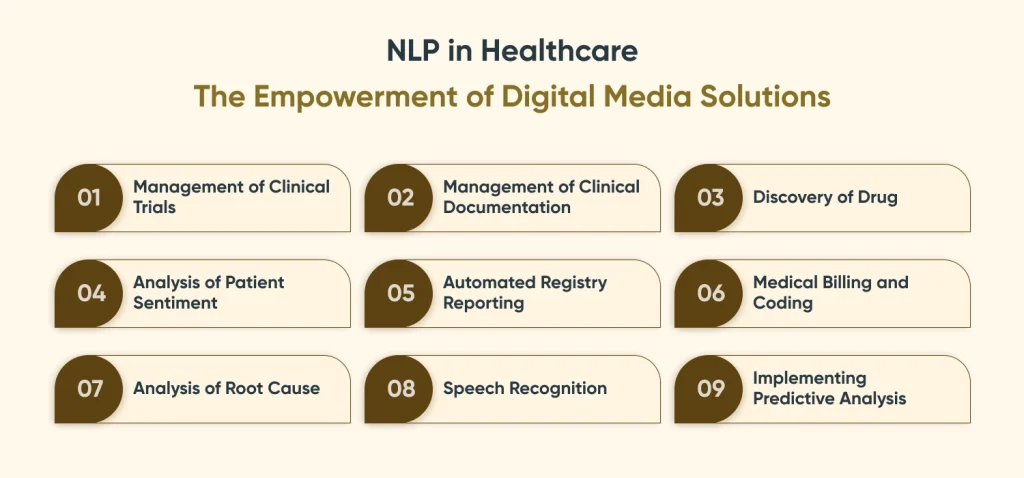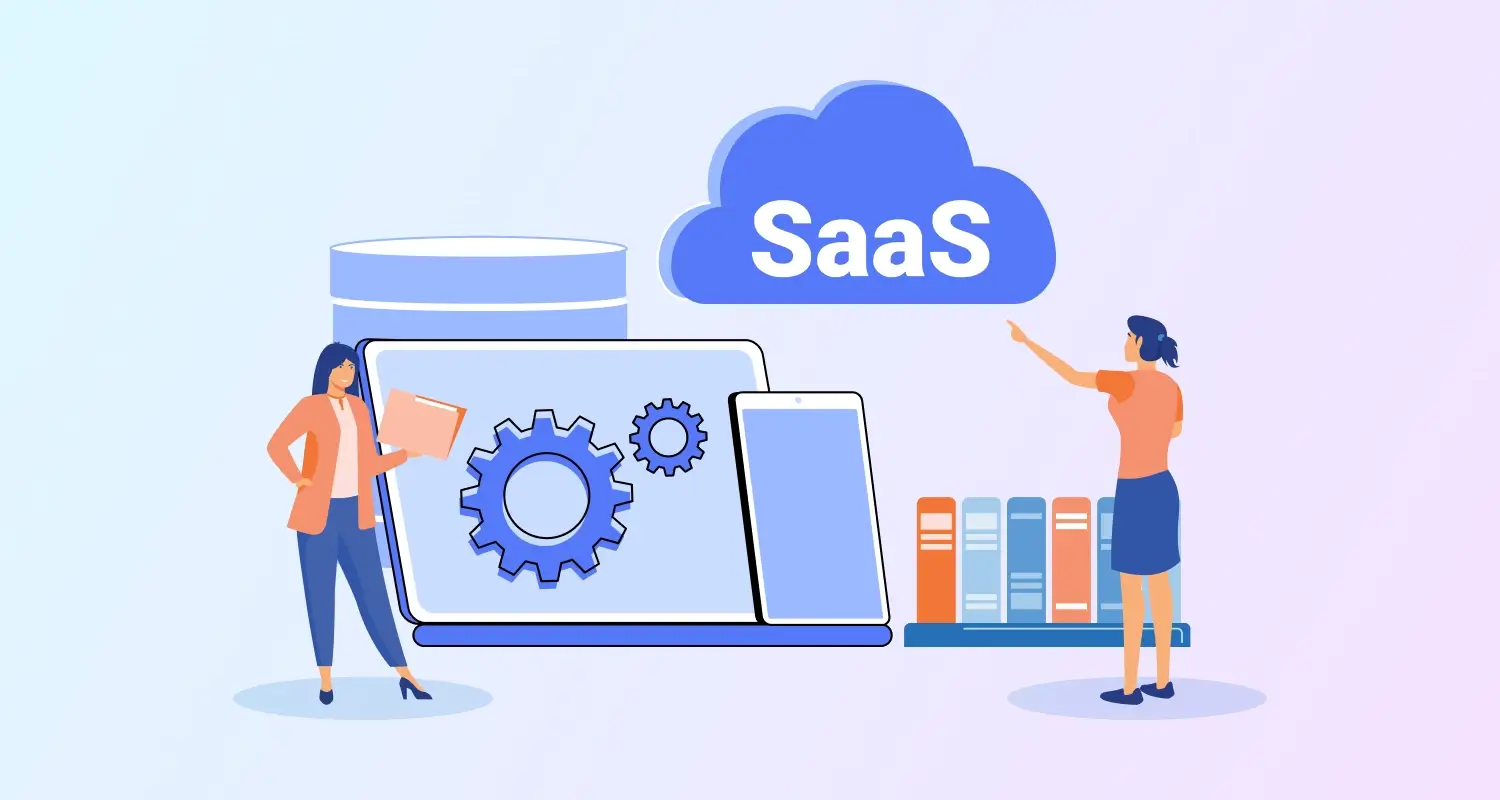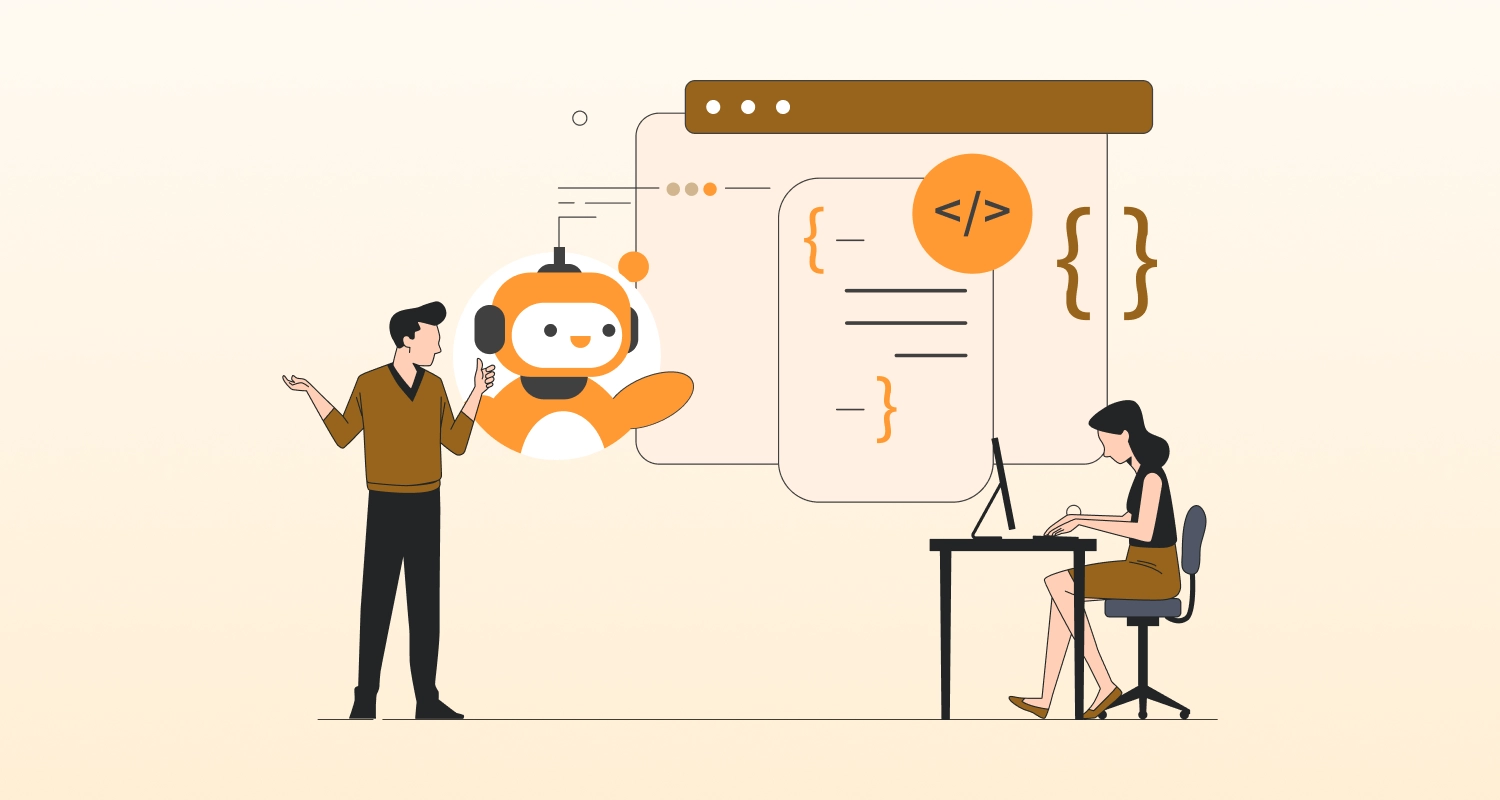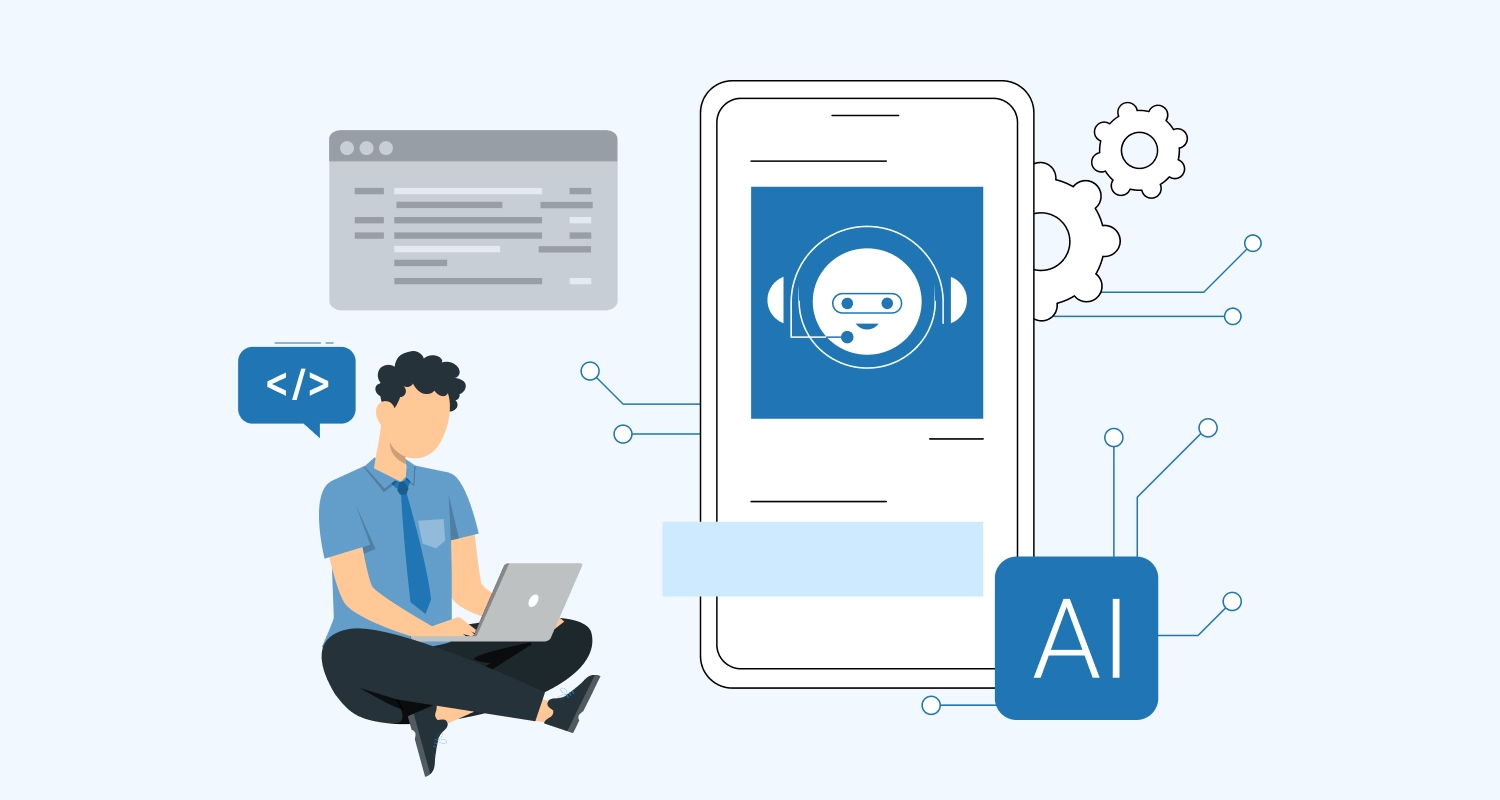The healthcare industry is transforming rapidly to make operations faster and effortless. With the introduction of NLP in healthcare, people have seen considerable changes in the sector. This is possible with the help of AI software development to meet the multiple requirements of the stakeholders. With the help of NLP, several working procedures in healthcare sectors have improved to a great extent.
Some of those are streamlined operational procedures, improved patient care, conduct thorough research, and more. As per Statista, in 2025, the market size of NLP is estimated to reach US$36.42bn. Thus, it is evident that how NLP is is quite important nowadays. Now, let’s see how it is helping.
NLP in the Healthcare Sector: What is it?
NLP works as a strong bridge between human interactions and healthcare data. Just by analyzing some patient interactions, doctor’s notes, and medical reports, NLP software has the power to extract some crucial insights, help in drug discovery, and even predict potential health risks. Thus, today, many healthcare providers are working with a reliable Healthcare software development company to help their patients as much as possible.
Today, technology has a great role to play in many healthcare-related tasks, and hence, NLP has become an essential part of the healthcare sector.
NLP in Healthcare: The Empowerment of Digital Media Solutions
Nowadays, there are many ways in which NLP is helping healthcare systems to work effectively and accurately. Some of those are as follows:

Management of Clinical Trials
NLP has a vital role to play in the proper management of clinical trials. It works by extracting and then analyzing large amounts of clinical data. All these pieces of information come from trial protocols, medical records, and even research literature.
It can help by streamlining recruitment procedures, identifying eligible patients, and enhancing patient stratification, depending on certain criteria.
Several tools of NLP help in several important tasks like ensuring compliance with rules, monitoring adverse situations, and analyzing the outcomes of trials quite efficiently.
NLP has the power to improve both the cost-effectiveness and speed of various important clinical trials, along with maintaining data security and patient safety. Moreover, NLP can always help in data-driven decision-making.
Management of Clinical Documentation
NLP in healthcare is helping numerous people in many ways. It has revolutionized clinical documentation procedures just by converting the spoken words of professionals into structured data. It has the power to automate the transcription process of doctor-patient interactions, resulting in more accurate and faster treatments than various conventional ways.
NLP has improved the efficacy of healthcare systems just by reducing the paperwork time of medical professionals. Thus, they can have more time to take care of their patients. Moreover, NLP systems can easily extract key information from important medical documents and analyze them. This has helped a lot in better decision-making as well as cooperation with different healthcare settings.
Discovery of Drug
NLP in healthcare can transform the procedures of drug discovery by efficiently analyzing several vital elements. Some of those are scientific articles, biomedical literature, clinical trial data, and even various types of patients.
The algorithms of NLP can both extract and synthesize important information regarding molecular interactions, potential targets of drugs, and even therapeutic outcomes. Just by exploring these hidden relationships and patterns in various datasets, NLP can speed up the identification of reliable drug candidates as well as facilitate the generation of various hypotheses for future research.
NLP in healthcare follows a powerful data-driven approach and hence can help in several ways. Some of those are reducing time-to-market for new therapies, enhancing research productivity, and also helping in treatment innovations.
Analysis of Patient Sentiment
NLP techniques can help by analyzing patient feedback from different sources, such as social media, surveys, and also electronic health records. NLP in healthcare can easily improve patient care experiences just by understanding patient opinions and sentiments.
Analyzing patient sentiment can help in detecting trends, increasing patient satisfaction levels, and also timely response to patient concerns. This proactive approach can eventually enhance patient satisfaction, engagement, and even their trust on various healthcare services.
Automated Registry Reporting
NLP can streamline the reporting of clinical data to various health registries just by automating several tasks like data extraction, loading, and transformation. It can make sure that required data elements are submitted timely to regulatory bodies as well as public health agencies.
The algorithms of NLP can easily handle both unstructured and structured data sources, and hence, can improve the reliability of registry submissions. By eliminating errors and automating various repetitive tasks, healthcare organizations can focus on various important tasks, such as quality improvements, data analysis, etc.
Medical Billing and Coding
NLP can easily automate all types of medical coding and billing procedures by converting procedure descriptions and physician notes into standardized notes. All these can help a lot in following compliance and reimbursement.
Automated procedures can eliminate errors, accelerate the billing cycle, and improve coding accuracy. Hence, healthcare providers can enjoy faster payments and improved revenue management.
NLP algorithms can learn and adapt to the constantly changing coding standards and rules of the healthcare sector. Hence, those can ensure that numerous healthcare organizations can become financially visible in a complex landscape of reimbursement.

Analysis of Root Cause
An advanced thing about NLP in healthcare is root cause analysis. It helps a lot in the procedure of why specific health issues are taking place. NLP, along with various digital records can reveal health patterns in different groups. All these groups are created depending on race or location which can impact their health outcomes.
Traditional databases can’t figure out how society and culture impact health on a large scale; however, NLP can do this easily. Thus, medical professionals can explore some new ways to learn about different health issues.
Speech Recognition
Today, there are several speech recognition technologies that are driven by NLP that can easily convert spoken words into text. Hence, it can enable many healthcare professionals to create detailed and accurate clinical documentation within the very short time.
It can transcribe patient consultations, medical dictations, and even surgical notes with incredible speed and accuracy. Thus, it can improve documentation efficiency as well as workflow productivity.
Various speech recognition systems can effortlessly integrate with EHR software development and clinical information systems. Thus, the task of making all types of patient information accessible and searchable has become very easy.
Implementing Predictive Analysis
In healthcare sectors, the use of Predictive Analysis can help doctors find patients who can get sick quickly. Moreover, it can help doctors to find out what are the problems with a patient. Just by using NLP and Predictive Analytics together, doctors can offer timely and accurate predictions regarding the health of a patient.
NLP in Healthcare: How Is It Improving Patient Care
Just by implementing NLP-related solutions, both healthcare providers and patients can enjoy a lot of benefits. Some of those are as follows:
It Gives Power to Patients
Today, there are several mobile apps powered by NLP that can offer patients with real-time access to accurate medical records. This has helped in informed decision-making to a great extent.
It can Manage Large Data Sets
NLP can streamline the processing of huge amounts of unstructured medical data. This can help healthcare professionals to take care of their patients without any problems.
It can Enhance Diagnosis and Treatment
NLP can easily identify all the patterns and potential risks within a very short period. Thus, it can help in more accurate diagnosis as well as timely and personalized treatment plans.
It Can Automate Tasks
NLP can easily automate various types of repetitive tasks in the healthcare sector with the help of Machine Learning and RPA. Due to this, tasks like data entry and report generation need only a few minutes to complete. Thus, clinicians can have a lot of free time to take care of their patients.
It can help in Advanced Patient Monitoring
With the help of NLP, healthcare systems can easily predict potential health problems. Moreover, with NLP, they can even take care of and monitor high-risk patients as much as possible.
It Helps in Personalized Healthcare
Today, NLP can help a lot in personalizing patient experiences by analyzing communication and then tailoring interventions accurately.
Conclusion
So, we can say that NLP in healthcare can offer some new and efficient ways through which medical professionals can take care of their patients with ease. NLP offers some praiseworthy methods that can help doctors, nurses, and other medical professionals to find out the health issues of their patients, offer them timely and accurate treatment, and eventually improve their health condition and increase their satisfaction level.
Thus, many people can now build a medical tech startup with the help of a reliable healthcare software development company that has some NLP experts.
Frequently Asked Questions
How Can I Use NLP To Detect Medical Errors?
NLP can look at various medical records for some vital structures that can indicate potential challenges. Some of those can be hazardous drug responses, dosage disparities, etc.
Is It Possible To Use NLP In The Development of New Drugs?
NLP can the entire healthcare sector in many ways. However, it cannot produce drugs directly. It can accelerate the procedures of drug development by assessing large amounts of medical theories and finding useful therapeutic targets.
What Advantages Can I Enjoy By Using NLP in Healthcare?
There are many advantages that you can enjoy just by implementing NLP in healthcare. Some of those are accurate clinical documental, improved patient care, clinical trial matching, reduced costs, predictive analysis, and more.
Does NLP Have the Capability To Improve Patient Outcomes?
There are multiple ways through which NLP can improve patient outcomes. Some of those are improved clinical decision-making, better treatment recommendations, improved diagnostics, improved care delivery, improved patient experience, etc.







